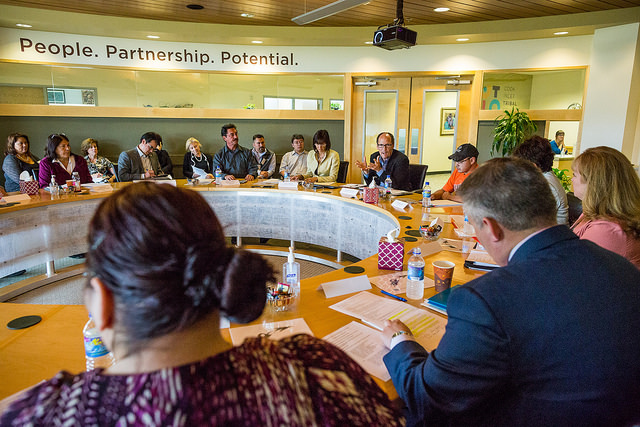
Ed. note: This is cross-posted on the U.S. Department of Labor's blog. See the original post here.
Since Labor Secretary Tom Perez arrived one year ago this week, he has referred to the Department of Labor as the “Department of Opportunity.” He believes it’s our mission to expand opportunities by ensuring that all Americans are treated fairly at work, that they are safe while on the job, and that they have access to the training and employment resources to achieve their goals. And he’s made this a priority for Native Americans and Alaska Natives, who often face unacceptably high levels of unemployment in their communities and tribal nations.
Earlier this week, Secretary Perez traveled to Alaska to meet with leaders from the Cook Inlet Tribal Council to see how our investments − through grants from the department’s Division of Indian and Native American Programs − are creating opportunity for native peoples. Gloria O’Neill, who has served as president of the council since 1998, shared how the funding has helped expand social services for her community: Today, more than 12,000 individuals benefit annually from a wide array of programs, including child and family services, education, employment and training services, and programs helping formerly incarcerated individuals successfully transition back into their community.
He also met with Erika Kalilikane, a single mother who went through a department-funded training program to learn medical billing and coding. Erika is a perfect example of how these programs are helping to expand opportunities for not just her, but her family as well. After completing the program, the council helped Erika find a job at LifeMed, a critical care and air ambulance service. Today, Erika is earning enough to also help her son pay for college.
The council and dozens of other organizations around the country are supported by grants through the department’s Division of Indian and Native American Programs. This year, the department has awarded nearly $58 million to 180 tribal nations and Native American organizations. Of these funds, $46 million will serve low-income and unemployed individuals, and another $12 million will be targeted toward services for Native American youth.
These funds enable tribal nations and nonprofit organizations who serve tribal communities to provide academic, occupational and literacy skills for native populations, helping to make them more competitive in the workforce. These efforts are also designed to help promote the economic and social development of Indian and Native American communities in accordance with their own self-determination, goals, and values.
On Tuesday, President Obama signed the Workforce Innovation and Opportunity Act into law, the first major update to federal workforce programs in over 15 years. This law will help streamline and coordinate employment and training programs across federal, state, and local levels. WIOA will also continue the important work of Section 166 of the Workforce Investment Act in helping tribal nations and Native American organizations create a skilled workforce in Indian Country.
Jeremy Bishop is a special assistant to the Secretary of Labor.



